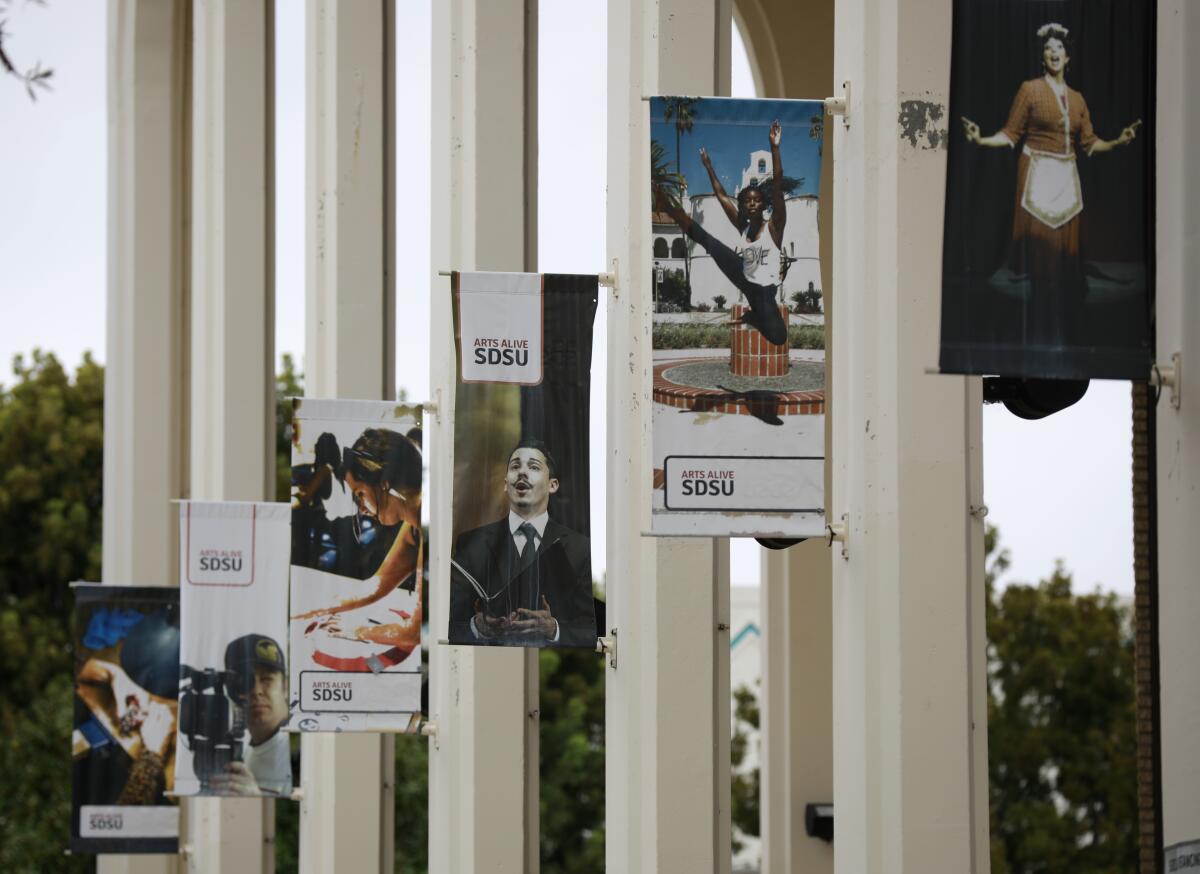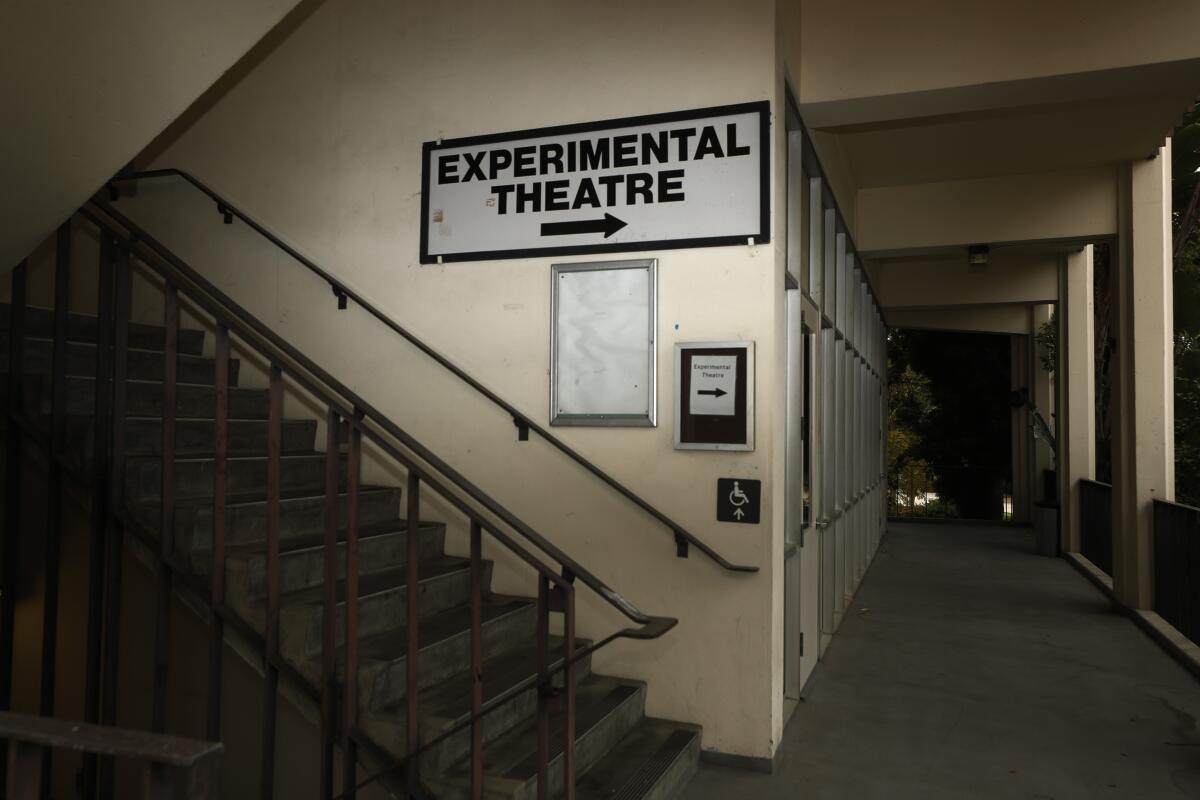SDSU lecturer’s portrayal of racial stereotype adds to debate over academic free speech

- Share via
Is Bob Jordan a victim of “cancel culture”? Or is he being justly criticized for his use of a stereotype about Black people in a cinema course he teaches at San Diego State University?
There are sharply opposing views on that at SDSU, mirroring a heated local and national debate over what’s acceptable language in an academic setting, especially during a time of heightened tension over racial justice.
SDSU faculty last year revolted against a proposal that could have hurt their benefits if they said or did things that were perceived to harm the school’s reputation. The University of San Diego is investigating one of its professors for making a remark online that some considered to be anti-Asian. And Cal State San Marcos is considering banishing the name of the university’s founder over anti-immigrant remarks that were made nearly 30 years ago.
The latest controversy at SDSU erupted from Jordan’s “Introduction to Cinema” course, one of two he was teaching until last week, when he was replaced by the university. (The other was “History of Prime Time TV.”)
The topic of the April 12 class was the psychological thriller “Fatal Attraction” — a film that, it should be noted, includes no lead characters who are Black. It was pre-recorded and broadcast online. (Much of SDSU’s curriculum is temporarily virtual, due to the pandemic.)
Jordan, a veteran lecturer, referred to Black people as part of a larger discussion about race, gender and nationality in film. He told students he would express beliefs that he personally did not hold to make a point about racial ideology.
Speaking in a first-person style, Jordan said, in part, “I might have an assumption that Black people are just not as intelligent as white people. Oh, I can hear already people getting all riled up, right. I can believe that ...
“That’s just the way that, you know, my values are. It doesn’t mean I am going to come and lynch you. It doesn’t mean that I am going to do something attacking you. It might mean that I won’t hire you ... “
Students were not able to respond to the instructor in real-time because the class was prerecorded. But on the internet, reaction was swift and sharp.
An unidentified person took a 50-second video clip from the class and posted it on Twitter, conveying what Jordan said. The clip drew lots of anger, including from people identifying themselves as SDSU students.
“He could have chosen ANY other example but he hadddddd to use a racial one, mannnnn....” said a person using the Twitter handle NIKKI.
The video also bothered Blake Howard, an SDSU student who has been taking Jordan’s course on television.
“He’s been using examples about race a lot, even when there didn’t appear to be a need for it,” Jordan told the Union-Tribune. “It’s been hard to tell when he’s being hypothetical and when he isn’t.”
SDSU, which has faced several racial and free-speech issues in recent years, posted a short, unsigned message on Twitter noting that Jordan had insisted that the harsh language “in no way represents his personal views or opinions.”
The school also supported his right to academic freedom, which gives teachers great latitude to say provocative things in their field of expertise. It differs from free speech, which gives a person a broad right to say anything.
SDSU President Adela de la Torre would not answer questions about the Jordan matter from the Union-Tribune. Nor would Luke Wood, the school’s vice president of student affairs and campus diversity.
Jordan did talk with the Union-Tribune, but later said in an email, “I’ve been instructed not to speak any further with anyone from the media and specifically not to show that lecture to anyone outside of campus officials.”
In a statement, the university said on Saturday, “The university did not and does not discourage faculty from speaking with reporters, and the university did not tell Jordan not to speak with members of the media.”
The controversy has already affected what Jordan teaches.
He said during a recorded interview that he dropped plans to lecture on the work of famed Black actor Sidney Poitier — who appeared in many movies involving questions of race — and switched his focus to the romantic comedy “Singin’ in the Rain.” His courses were handed over to other instructors after his remarks sparked anger.
Jordan, who holds masters degrees from SDSU and USC, defended his teaching method of portraying an imaginary person and describing how they might speak about race and culture.
“If you listen to this lecture in its entirety, I not only say that Black people are not intelligent, I also say that some people grow up thinking Jews are greedy, and that’s just the way they assume the world is,” said Jordan, who is 60, white, and lives in El Cajon.
“I have also said in that same lecture that some people are brought up to mistrust Asian folks in the community ...
“What I was doing was basically a speech technique. I was saying something that other people in another time, in another era, in another location, might believe and might consider common sense.”
He drew support on this point from Peter Atterton, an SDSU philosophy professor and member of the university Senate.
“While his presentation may have been a little artless, even clumsy, it seems to me what he did is essentially no different from what an actor does when they play a role,” Atterton said in an email. “Professor Jordan was teaching an introduction to cinema class after all.
“Consider the actor Ralph Waite, who played the vicious slave ship overseer in the miniseries ‘Roots.’ Do we criticize him for it, morally speaking? Of course we don’t. That would be foolish. Indeed, it would be just as foolish to consider him a good husband and father because of his role in ‘The Waltons’!”

Jordan also got support from Adam Steinbaugh, an attorney for the Foundation for Individual Rights in Education (FIRE), a Philadelphia-based civil rights group that focuses on academia.
“People are supposed to be able to say things that others would view was indelicately said or a mistake or improperly argued,” Steinbaugh said. “That is what that exchange is supposed to be about. And students have their own right to respond to it and criticize it.”
The incident drew a far different reaction from Jahfreen Alam, editor of the Guardian, a newspaper at UC San Diego.
“No matter what the intent was, how are you going to tell a Black student that I’m not going to physically hurt you, don’t worry about that,” Alam told the Union-Tribune in an email. “I can’t believe he used the word ‘lynch’ either! Especially with recent events, it’s completely tone-deaf and insensitive on his part.”
Alam was referring to the fact that Jordan’s remarks came while former Minneapolis police officer Derek Chauvin was standing trial for the murder of George Floyd. He was found guilty on Tuesday.
Jordan said the trial was not on his mind.
Dilip Jeste, a psychiatry professor at UCSD, says the sharp exchanges that occur on platforms like Twitter often reflect the anger, depression and isolation that people feel due to such things partisan politics, the pandemic and the struggle to get and keep a decent jobs.
“While I fully believe in academic freedom of speech, I believe even more strongly in the need for empathy and compassion, “he said. “Teachers must take into account the thoughts and feelings of their students coming from various diverse communities, and they must avoid actions that will hurt others.”
Robbins writes for the San Diego Union-Tribune
More to Read
Updates
12:13 p.m. April 25, 2021: This story has been updated to include additional information from Dilip Jeste.
2:31 p.m. April 24, 2021: This story has been updated to include a statement from SDSU denying it instructed Jordan not to talk with the media.
Sign up for Essential California
The most important California stories and recommendations in your inbox every morning.
You may occasionally receive promotional content from the Los Angeles Times.














